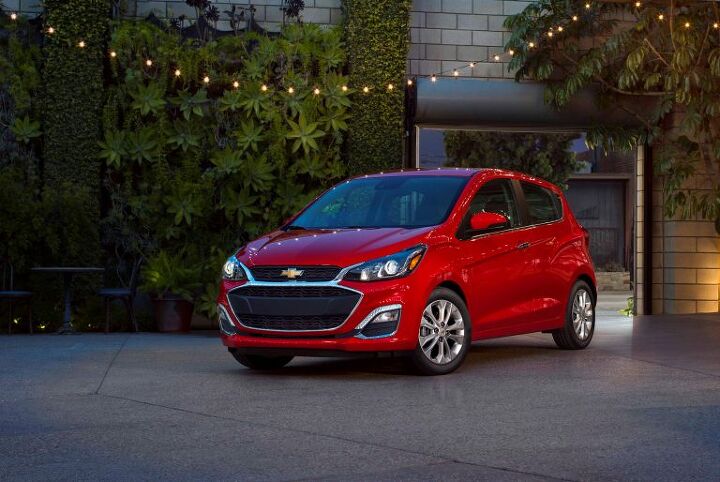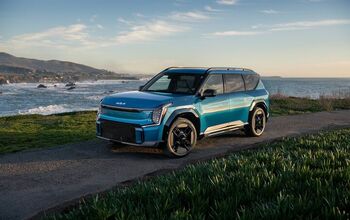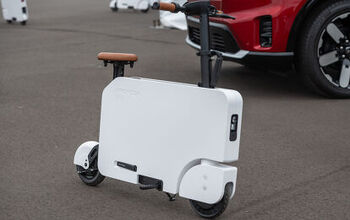Forget Sex and Adventure - Fear Could Be the Big New Sales Motivator

It’s something we’ve touched upon in the recent past: the fact that, in these pandemic times, a private vehicle is the safest way to get around (from a contagion standpoint). It seems we’re not the only one to rethink the attributes of a personal car. Japanese driving schools are suddenly doing a booming business. Cars.com reports a sudden surge in non-car-owning visitors.
According to data accumulated from numerous countries, automakers could find a slew of newfound buyers once the strictest lockdown measures end.
As reported by the Detroit Free Press, a survey of residents in 11 major car-buying countries shows a healthy desire for private car ownership.
Consulting firm Capgemini provided automakers with food for though in its survey of 11,000 participants. Of the people surveyed, 35 percent claimed to be considering or strongly considering a car purchase this year. It’s worth noting that these 11 countries represent 62 percent of the world’s new vehicle volume.
The participants were surveyed in early April, arguably at the height of the pandemic in Europe and before the peak in the United States. Countries involved in the survey were China, France, Germany, India, Italy, Spain, Sweden, the Netherlands, Norway, the UK, and the United States. Of particular interest was the desire for vehicle ownership among young adults, who outpaced the over-35 crowd in their hunger for wheels.
Those younger than 35 replied 45 percent in the affirmative to the question of whether they planned to buy a car this year. Overall, respondents in China and India were most likely to be considering a vehicle buy (61 and 57 percent, respectively), with hard-hit Italy in third place with 43 percent. Spain and the U.S. came in at 36 and 34 percent, respectively.
“We’re going to see individual vehicle usage rise as people more concerned with hygiene choose personal transportation,” said Daniel Davenport, senior director of Capgemini’s North American Automotive sector. “There’s also more interest in car ownership from customers under 35 years old.”
The myth that no Millennial or Gen-Z individual wants to own a car in the West is just that, despite its prevalence among urban mobility types. However, income and living situation dictates whether or not that dream of a driveway with a shiny new car in it comes to pass, and it will remain so. As much as a survey respondent might want a car to keep them safe from COVID-carrying transit riders, their personal finances will ultimately propel them into a dealership or keep them forever away. Automakers can’t do much about the economy and urban living expenses, but at least they know the desire is there.
That potential future demand is also shown in global attitudes towards transit and ride-hailing use. Of the 11,000 participants, 46 percent said they’d be less likely to use transit in the future. Thirty-three percent said they didn’t expect their transit use to change. Ride-hailing saw a similar result, with 43 percent saying that, in the future, they’d avoid taking an Uber or Lyft out of fear for their health (versus 35 percent who said otherwise).
In the U.S., the percentage of respondents predicting less personal public transit use this year was 51, with 53 percent of them expecting less transit use in the future. On the topic of ride-hailing, 49 percent of Americans said they’ll use it less in the coming months and years.
All of this hinges on the coronavirus remaining a stealthy and deadly adversary that lurks everywhere. Were the virus to be eradicated, either by natural mutation or through the discovery of a vaccine, this survey would carry as much predictive weight as a lone atom. For now, though, the virus is very much front and center in peoples’ minds.
When asked whether they thought they’d be in greater control of hygiene in a personal car, 75 percent of the participants replied yes. Asked whether owning a personal vehicle would reduce the chances of becoming infected (when compared to other forms of transport), 68 percent nodded in agreement. Interestingly, 58 percent said they feel the price of new vehicles will drop in the near future.
If an automaker can somehow make a sizable profit off a small car that meets restrictive American and European emissions and fuel economy mandates, now’s the time to test the theory. The coming year could be fertile ground. Once lockdowns end across North America and Europe, we’ll be keeping our eye on sales of existing small cars. I’m sure Chevrolet would be happy to sell you a Spark right now.
[Image: General Motors]

More by Steph Willems
Latest Car Reviews
Read moreLatest Product Reviews
Read moreRecent Comments
- Analoggrotto Does anyone seriously listen to this?
- Thomas Same here....but keep in mind that EVs are already much more efficient than ICE vehicles. They need to catch up in all the other areas you mentioned.
- Analoggrotto It's great to see TTAC kicking up the best for their #1 corporate sponsor. Keep up the good work guys.
- John66ny Title about self driving cars, linked podcast about headlight restoration. Some relationship?
- Jeff JMII--If I did not get my Maverick my next choice was a Santa Cruz. They are different but then they are both compact pickups the only real compact pickups on the market. I am glad to hear that the Santa Cruz will have knobs and buttons on it for 2025 it would be good if they offered a hybrid as well. When I looked at both trucks it was less about brand loyalty and more about price, size, and features. I have owned 2 gm made trucks in the past and liked both but gm does not make a true compact truck and neither does Ram, Toyota, or Nissan. The Maverick was the only Ford product that I wanted. If I wanted a larger truck I would have kept either my 99 S-10 extended cab with a 2.2 I-4 5 speed or my 08 Isuzu I-370 4 x 4 with the 3.7 I-5, tow package, heated leather seats, and other niceties and it road like a luxury vehicle. I believe the demand is there for other manufacturers to make compact pickups. The proposed hybrid Toyota Stout would be a great truck. Subaru has experience making small trucks and they could make a very competitive compact truck and Subaru has a great all wheel drive system. Chevy has a great compact pickup offered in South America called the Montana which gm could make in North America and offered in the US and Canada. Ram has a great little compact truck offered in South America as well. Compact trucks are a great vehicle for those who want an open bed for hauling but what a smaller more affordable efficient practical vehicle.

































Comments
Join the conversation
I can tell there are a few people who constantly post on here who know all about all and aren't afraid to let everyone know it. Fact: Mass transit (and let's leave our isolated American bubble here) is a must have necessity for a massive chunk of the world. For those who have a few stamps in their passports, you'll know cities like London, Paris, Berlin, Moscow, and all large Japanese cities would not function without their subways. They aren't littered with the dregs of society...they are filled with commuters who don't want the misery and high cost of driving. (Go to London and drive around...in 20 minutes, you'll be looking for a Tube station and abandon the car.) All over Africa and Asia, massive cities have hundreds if not thousands of miles of bus routes that take everyone to work, especially in cities like Lagos, Kinshasa, Nairobi, and Abidjan that are so crowded and expensive, car ownership isn't practical. Are they the dregs of society that don't deserve a safe ride to work and home? And look at American cities when their mass transit unions go on strike. Places like Philadelphia, Chicago, San Francisco, Boston, NYC, Washington, DC all go into crisis mode because millions of commuters suddenly have lost their ride to work. Not everyone lives in a small town in Middle America - the reality is that living and driving in places like Boston and NYC involve parking, tolls, congestion charges, and the wear and tear on your car just by driving it in an urban area. Even places that just have bus lines - midsized cities of 300,000+ people - still have plenty of good people commuting to work, providing for their families and they need a bus. Spread out cities trying to expand their lines - think Las Vegas, Phoenix, Charlotte - that might be a challenge. But the large cities with massive mass transit networks - those have to function safely. Think masks, gloves, and frequent scrubbings for the future. That's true for the entire world.
Interesting article. The ripple effects of the crisis are having the largest impact on the world since the fall of the Soviet Union IMO.